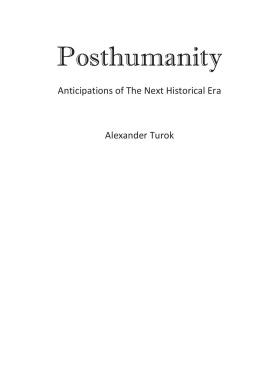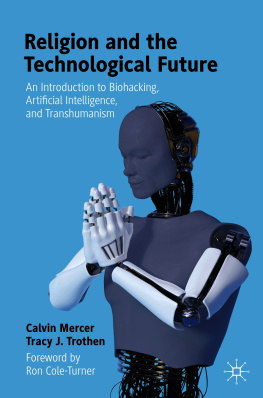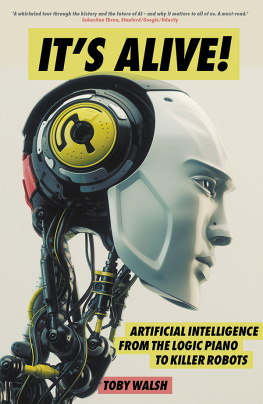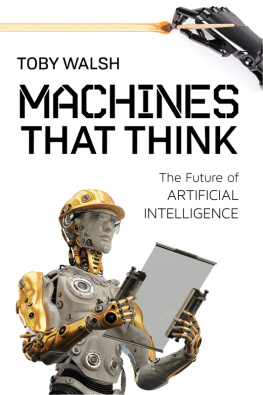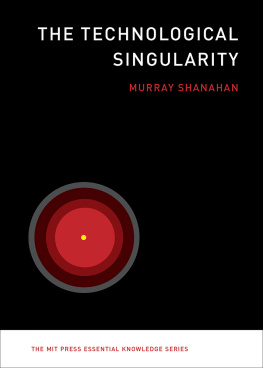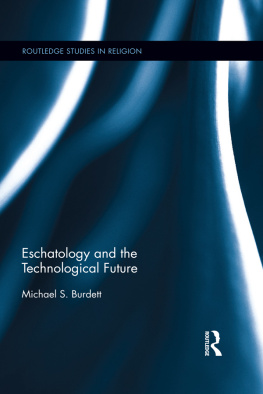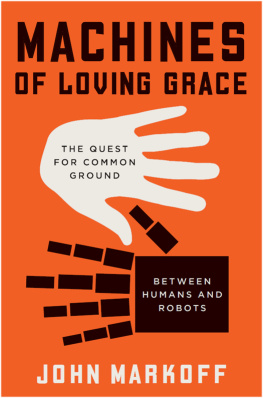Posthumanity
Anticipations of The Next Historical Era
Alexander Turok
Copyright 2018 by Alexander Turok
All rights reserved.
June 15, 2018
ISBN 978-1-387-90724-3
I dedicate this book to those who will work to makehuman genetic engineering safe, affordable, and politicallyacceptable.
Acknowledgements
For their ideas which inspired me to write this book, I thank James Thompson, Steve Sailer, Scott Alexander, Razib Khan, Gregory Cochran, Henry Harpend-ing, James Miller, Tyler Cowen, Stephen Hsu, Robin Hanson, Michael Kantor, Anatoly Karlin, and John Derbyshire.
Table of Contents
Introduction....................................................................................................1
The Origin of the Posthuman Era.................................................................15
1. Our Position in History ..........................................................................17
2. Genetic Engineering...............................................................................30
3. The Great Wait.......................................................................................49
4. The Posthuman Revolution....................................................................69
Macro-Posthumanity....................................................................................83
5. Population and Family Planning ............................................................85
6. Economics..............................................................................................98
7. Politics and International Relations .....................................................106
8. Crime....................................................................................................119
9. Law Enforcement and the Surveillance State ......................................135
10. Hostile AI...........................................................................................146
Micro-Posthumanity ................................................................................... 163
Personality .......................................................................................... 165
Relationships ...................................................................................... 177
13. Consumer Goods................................................................................ 190
14. Education ..........................................................................................24
Gaming ............................................................................................... 217
Drugs .................................................................................................. 222
Meta-Posthumanity .................................................................................... 233
17.Philosophy, Religion, and Self-Perception .......................................235
18.Extreme Projects ...............................................................................250
19.Galactic Expansion ...........................................................................267
Notes .......................................................................................................... 275
Bibliography............................................................................................... 287
Introduction
A few hundred thousand years ago, in early human (or hominid) pre-history, growth was so slow that it took on the order of one million yearsfor human productive capacity to increase sufficiently to sustain an additional one million individuals living at subsistence level. By 5000 BC,following the Agricultural Revolution, the rate of growth had increasedto the point where the same amount of growth took just two centuries.
Today, following the Industrial Revolution, the world economy grows onaverage by that amount every ninety minutes. Nick Bostrom1
7% of humans who have ever lived are alive circa 2017.2 This is a testament to how much the human population has increased since the Industrial Revolution.
Even if the human population and life expectancy hereafter stagnates, it will take but a millennium before the majority of people who have lived will live in your future rather than your past. In the very long run, almost all humans will live there. If we consider our ancestors to merit our attention through the study of history, I argue that we should make a similar effort to study the lives of our descendants. But can we study the future? Whereas the past seems clear to us, the future appears unknowable. But the successes of past futurists demonstrate that the future is knowable, albeit imperfectly. And studying the future has a major advantage over studying the past. We cant change the past, nor can we communicate with it. But we will live in the future, and our writings will be available to future historians. They may find them quite useful.
The job of a historian is not merely to chronicle the past, but to provide explanations for how events in the past led to one another. Technology is an ever-present explanation for social changes. But the simple fact that a social change occurred after a technological change is weak evidence for causality.
The historian will look for more evidence, using economic and social theory to determine that one should have expected the technology to cause the social change. But he must avoid the accusation of hindsight bias. If he did not already know it would happen, would he still have determined that it should be expected?
A futurist who wrote comprehensively about the effects of the technology before it was developed or put into widespread use avoids this bias. If we consider our futurists to be as knowledgeable and careful as our historians, and yet they did not predict that the social changes would follow from the technology, the causal link becomes weaker. If we still think the case for the causal link is strong enough to assert, we must then ask ourselves if there was anything wrong with the economic and social theories of the futurists which led them to miss it.
In this way, futurism allows us to put our economic and social theories to the test. But if we put little effort into futurism or if we leave it to individuals we consider less knowledgeable and careful than our historians, we and future historians will lose this powerful tool. This is one reason why I believe futurism is valuable and deserving of more attention that we give it in our time. Works of futurism are, at the time they are written, unfalsifiable, unlike works of history. But this is only temporary. The historian of the future will judge modern futurism by the same rigorous standard as he will judge modern history. If you still think futurism to be pointless, ask yourself if you would be uninterested in predictions about your time made by writers in the past. I would think most would find these predictions quite interesting, perhaps more than any other subject that the pasts writers concerned themselves with.
Past Futurism
It is sometimes claimed that the future is inherently unpredictable, but through past futurism we know that this is untrue. Many did successfully anticipate the future, and one could argue that many more would have done so, had more effort been put into futurism.
Futurism evolved together with science fiction, and both only arose after the industrial revolution.3 Nobody predicted the Industrial Revolution in the way we predict the singularity, generation ships, and indefinite lifespan due to medicine.
When preindustrial storytellers described humans living forever or travelling to space, it was explained as a result of magic or a gift from the Gods rather than as an achievement of human technology. The whole idea of progress, something we take for granted, did not exist before 1500, when it began to emerge slowly out of the age of discovery and the scientific revolution. While considerable technological advances were made before 1500, they occurred at a rate that was so slow that they were forgotten, with preindustrial storytellers remembering an unchanging past. In the Bible, after God casts Adam and Eve out of the
Next page
